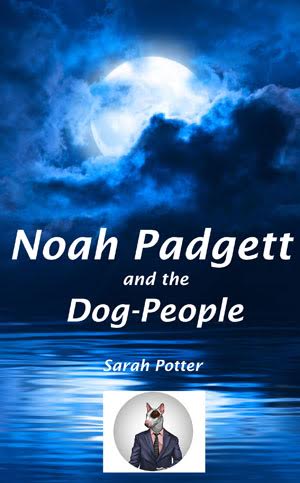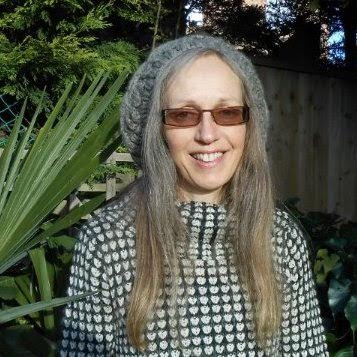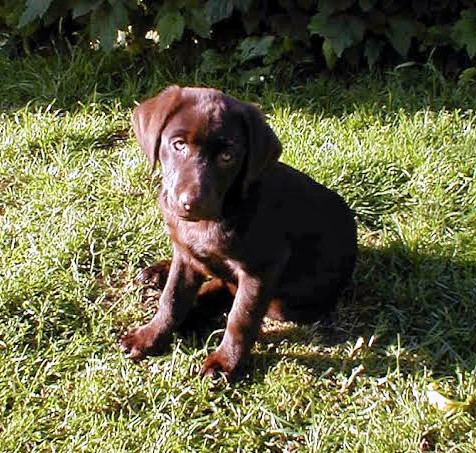It’s my great pleasure to start the year off by interviewing Friday Fictioneers regular, Sarah Potter who lives in a house on a hill, with panoramic views over the English Channel in SE England. Sharing the house are her husband, son and chocolate Labrador, all three of whom are great supporters of her literary endeavours. When not writing novels, she pens haiku and tanka poems, takes nature photographs, grapples with bindweed and snails in the garden, invents recipes, and sings mezzo-soprano.
What made you decide to be a writer?
My love affair with writing fiction and poetry blossomed at the age of eight. I could read before I went to school, which gave me a head-start with vocabulary. My mother read me lots of books as well; ones that were too advanced for me to read myself, such as The Sword in the Stone by T. H. White. Also, she made up stories off the top of her head. I remember in particular her tales about The Eccentric Man who liked to do things such as having operations without anesthetic (wince). At senior school, I wrote exercise-book length novellas: popstar or sci-fi romances mostly. These proved a great hit with my classmates, as well as my piano teacher, who showed one of my literary creations to her English teacher boyfriend. He responded with the words “That girl will be famous one day”. …Still waiting, although I do have the line of fame on my palm, so maybe there’s still time for his prophecy to come true. In my 20s, I was too busy making ends meet to have time to write much, apart from poems that moved almost imperceptibly between depressed rambles and black comedies. At the age of 36, I decided to go to evening class and study for an AS Level in English, which I passed with a straight A, with full marks for the creative writing module. The same year, I watched Kevin Costner’s movie, A Field of Dreams, in which he said something along the lines of “I’m 36 and if I don’t fulfill my dreams now, I never will”. That’s when I decided to write my first novel, a time travel romance set in a psychiatric hospital.
What is your favorite genre? Why?
This is a difficult question, as I read quite widely. My choice of fiction at any one time depends upon my mood. I’m not good with high literary, as it’s too exhausting. On the other hand, I can’t deal with pulp fiction that has two-dimensional characters and unadventurous vocabulary. There’s nothing that’s more of a delight to me than discovering a brilliant trilogy and reading all the volumes back-to-back. In particular, I love apocalyptic science fiction, with Justin Cronin’s “The Passage trilogy” at the top of my list. This genre fascinates me, not out of a sense of morbidity, but because of its epic scale. Throughout history people have demonstrated an amazing spirit of survival against a backcloth of good and evil, and the apocalyptic scenario takes them right to the point of extinction, yet there’s a core group with the vision and determination to fight back, using a combination of practical skills and a profound sense of community.
I enjoy Nordic Noir, too, especially Karin Fossum, and Scandinavian authors in general, my favourite being the quirky Danish author, Peter Hoeg, who writes in an accessible literary style. The novel for which he’s the most famous is Miss Smilla’s Feeling for Snow, but my personal favourite is his less well known satirical anthropological novel The Woman and the Ape.
“Desiccation” is mesmerizing. How did you come up with the idea? How long did it take you to write it?
 Desiccation is number three out of five novels, and was originally titled “Spaced-out”. They say write about what you know, so I based the setting for the story on the boarding school I attended in the latter part of the 1960s. The school never came under attack by body-snatching interdimensional aliens, although I seem to remember daydreaming about such things when I should have been concentrating on lessons. I did three months of research, which included reading a fascinating natural history book all about woodlice/pillbugs, followed by three months of writing the first draft. I sent the second draft out to a literary agent who said “I applaud your imagination and your writing skills, but it would be very hard to convince a publisher to take on a mix of science fiction, fantasy, and humour written by a first-time author”. After this, I cast Desiccation aside and left it to marinade for ages, then rewrote it, then left it to marinade again, until in 2015 my family persuaded me to have a go at indie publishing one of my novels. My son voted for Desiccation, on the grounds that he’d found the first draft so exciting that he’d stayed up all night reading it and spent all the following day falling asleep at school.
Desiccation is number three out of five novels, and was originally titled “Spaced-out”. They say write about what you know, so I based the setting for the story on the boarding school I attended in the latter part of the 1960s. The school never came under attack by body-snatching interdimensional aliens, although I seem to remember daydreaming about such things when I should have been concentrating on lessons. I did three months of research, which included reading a fascinating natural history book all about woodlice/pillbugs, followed by three months of writing the first draft. I sent the second draft out to a literary agent who said “I applaud your imagination and your writing skills, but it would be very hard to convince a publisher to take on a mix of science fiction, fantasy, and humour written by a first-time author”. After this, I cast Desiccation aside and left it to marinade for ages, then rewrote it, then left it to marinade again, until in 2015 my family persuaded me to have a go at indie publishing one of my novels. My son voted for Desiccation, on the grounds that he’d found the first draft so exciting that he’d stayed up all night reading it and spent all the following day falling asleep at school.
I’m reading “Noah Padgett and the Dog-People” which, so far, is a rare treat. What can you tell us about it?
This is my fourth novel. I’m marketing it as a middle-grade children’s novel, although I suspect that most of my readers are aged 40 plus (much the  same as with Desiccation). I like to think of Noah Padgett and the Dog-People as a multi-layered crossover novel that children and adults can enjoy at different levels. For instance, there’s Sergeant Salt and his Mercenary Lurcher Band, which is my joke on The Beatles’ album, Sergeant Pepper and his Lonely Hearts Club Band. Children possibly won’t pick up on this, but they will still find the characters entertaining. The book is available as an audiobook, as well on kindle and in paperback. For me, hearing my book read by talented actress Mil Nicholson, who’s brilliant with the characters’ voices and accents, is almost as exciting as having it made into a movie.
same as with Desiccation). I like to think of Noah Padgett and the Dog-People as a multi-layered crossover novel that children and adults can enjoy at different levels. For instance, there’s Sergeant Salt and his Mercenary Lurcher Band, which is my joke on The Beatles’ album, Sergeant Pepper and his Lonely Hearts Club Band. Children possibly won’t pick up on this, but they will still find the characters entertaining. The book is available as an audiobook, as well on kindle and in paperback. For me, hearing my book read by talented actress Mil Nicholson, who’s brilliant with the characters’ voices and accents, is almost as exciting as having it made into a movie.
The inspiration behind the story is my chocolate Labrador, who was a puppy at the time of writing. I kept having anxiety dreams in which I turned around for a moment and she disappeared, and the more I thought about it, the more the kidnapping of a beloved dog seemed like a disturbing central theme to a novel. Added to this, my mother used to breed and show dogs and my first job after leaving school was as a kennel maid, so again, it was writing about what I knew. Here’s my novel’s three sentence hook…
When Noah Padgett and his chocolate Labrador puppy disappear through a computer screen, they find themselves in the Zyx-dimension, where the main species is Canis sapiens. Bluebell soon falls into the paw-hands of deranged entrepreneur Monsieur Percival Poodle, who likes to collect alien specimens and believes himself above the law. Meanwhile, Noah ends up in a high security hospital for criminally insane Canis sapiens, with no apparent means of escape and terrified for his beloved puppy’s safety.
Who is the author who inspires you the most?
Apart from Rochelle Wisoff-Fields, you mean? ( 😉 ) This is a hard question to answer, as different authors have inspired me at different times in my life. These days I’m looking for five things in a book.
- I find it so engaging that it compels me to sneak read it at breakfast time.
- I care passionately about the fate of its characters.
- The writing is crafted so beautifully that it gives me profound “wow” moments.
- It teaches me something new, including techniques to improve my own writing.
- When I’ve finished reading it, I suffer withdrawal symptoms and can’t settle to read anything else for a week or two.
I’ve already mentioned some of the authors who fit this bill, but who to choose above all others? Here are the three authors who’ve taught me the most about writing as a craft: Donna Tartt, Rose Tremain, and Stephen King, and of those three, I would say that Donna Tartt triumphs over all.
How often do you write?
When I’m writing the first draft of a novel, I write for about five hours a day from Monday to Friday. For rewriting or editing, it’s around about three hours a day. Most weeks I write a haiku poem for the regular “Monday Morning Haiku” feature on my blog. Time permitting, I also participate in Friday Fictioneers, which I love. Any other writing is done at random times and scribbled on scraps of paper, which I scatter about the house or stuff in my coat pockets. Then I have to go on a hunt for them, having forgotten where I’ve put them, rather like a squirrel with its winter food hoard.
Do you have any other major projects in the works?
I’ve an idea for a new work, which I’m researching at the moment. This is for a “genre bending” novel, better known as mashup fiction. This involves taking a literary classic that’s in the public domain and melding it with a genre. An example of this is Pride and Prejudice and Zombies. At the moment, I’m reading the original Pride and Prejudice, and then I’m going to compare it to the mashup version and its sequel, Pride and Prejudice: Dreadfully Ever After. If I decide this type of novel is for me, I will go ahead writing it, with a view to submitting it to a traditional publisher or two. I’m keeping it close to my chest about which public domain work I intend to slaughter or enhance!
What are your writing goals for the future?
Ultimately, I would like to write a novel that literary agents and traditional publishers are willing to take a punt on. On the other hand, I don’t want to end up stuck with churning out novel after novel of the same ilk, unless I adore that ilk; otherwise, it will give me literary indigestion and a writer’s ulcer. If I can achieve recognition for my brand, namely “quirky fiction”, rather than for a particular genre, I will die happy.
Meanwhile, in the latter part of 2017, I might indie publish a third novel, most likely my medieval-style sword and sorcery fantasy adventure. This will be my experiment into whether it’s easier to market a novel that fits into a recognised subgenre, while still allowing for quirkiness. So far, my experience of marketing sucks.
What advice would you give other writers?
- Read widely.
- Learn techniques and pick up skills from other authors, but develop your own voice.
- Put your work under the microscopes of trusted beta readers who write well themselves and/or have editing experience. Don’t make changes immediately, but put the critiques aside for a week or two, especially if they annoy you! When you’ve calmed down and left your manuscript to marinade, compare the reader reports. If all of the readers pick up on a particular problem, then this problem needs addressing.
- Don’t rely solely on your computer’s spellchecker.
- Keep your writing muscles exercised, but don’t push it on days when you’re not in the mood. Go out for a walk or to the gym, meditate, have a sleep, clean the house, brush the dog, sing, dance, whatever. Anything other than writing total rubbish and beating yourself up about it.
- Observe life closely, through all of your senses.
- Give yourself plenty of thinking time.
- Eat regular meals and don’t prop yourself up on strong coffee and donuts.
- Don’t give up your day job and end up starving in your garret.
<><><>
Connect with Sarah:
Blog
Facebook
Goodreads
Twitter
Linkedin
Independent Author Network
Sarah’s Books on Amazon:
Desiccation
Noah Padgett & the Dog-People


